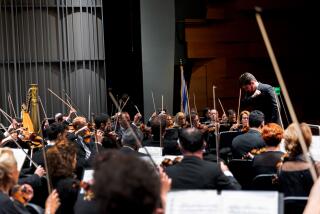Making sure Khachaturian gets his due
- Share via
Quietly obscured by this year’s dominant Berlioz bicentennial is another milestone: the centennial of the birth of the great Armenian composer -- indeed, the Armenian Tchaikovsky -- Aram Khachaturian. The mainstream musical institutions are just passing this one by, and record labels have not taken up the cause aside from a handful of single discs.
So a determined fan of Khachaturian’s music -- which for all its strong local color still has plenty to say to a general audience -- has to seek out comparatively under-the-radar events like pianist Sahan Arzruni’s “The Life and Music of Aram Khachaturian” at the AGBU Manoogian-Demirdjian School in Canoga Park on Sunday night.
Actually, there wasn’t much of Khachaturian’s solo piano music to be heard in the school’s small, comfortable, packed Agajanian Auditorium -- just excerpts from the Children’s Album, the brief Sonatina, and only the driving, Prokofiev-tinged first movement from the gigantic 1961 Piano Sonata. Yet Arzruni was able to draw an absorbing portrait of Khachaturian through other means.
In between selections in the first half of the evening, the pianist spoke candidly of his meeting with the burly, colorful composer in 1972, demonstrating how he used to play “In the Folk Idiom” (muscular and tight) and how Khachaturian actually wanted it played (dainty and swaying). Now that’s really useful, a working link with the composer.
In what little music there was, Khachaturian’s tasty folk flavors, lyrical signatures and fondness for circusy outbursts infiltrated even his simplest writing -- and Arzruni was a polished, persuasive advocate.
The entire second half was devoted to a sonically restored, official 1981 documentary on the life of Khachaturian -- reportedly shown in the U.S. for the first time. It was a sometimes crudely made affair -- the proto-music video effects for “Saber Dance” (frantic shots of New York City skyscrapers, etc.) were a hoot and a half -- and, of course, there was no mention of the infamous Zhdanov decrees of 1948 that temporarily derailed Khachaturian’s reputation (and those of Prokofiev and Shostakovich) in the Soviet Union. Yet the film offered many valuable glimpses of Khachaturian soulfully at work before the camera, as well as his voice from a series of interviews in the 1960s.
More to Read
The biggest entertainment stories
Get our big stories about Hollywood, film, television, music, arts, culture and more right in your inbox as soon as they publish.
You may occasionally receive promotional content from the Los Angeles Times.










